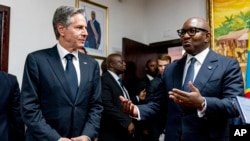Sub-Saharan Africa has one of the world’s fastest growing populations, largest free trade areas, most diverse ecosystems, and one of the largest regional voting groups in the United Nations. “Our strategy is rooted in the recognition that sub-Saharan Africa is a major geopolitical force, one that shaped our past, is shaping our present, and will shape our future,” said Secretary of State Antony Blinken.
“The United States and African nations can’t achieve any of our shared priorities, whether that’s recovering from the pandemic, creating broad-based economic opportunity, addressing the climate crisis, expanding energy access, revitalizing democracies, strengthening the free and open international order – we can’t do any of that if we don’t work together as equal partners.”
At the heart of the U.S. strategy for sub-Saharan Africa lay four priorities that we believe we must tackle together, said Secretary Blinken. “First, we will foster openness, by which we mean the capacity of individuals, communities, and nations to choose their own path and shape the world we live in.”
“The United States will not dictate Africa’s choices. Neither should anyone else. The right to make these choices belongs to Africans, and Africans alone.
At the same time, the United States and the world will look to African nations to defend the rules of the international system that they’ve done so much to shape.”
Our second priority is to collaborate with African partners to fulfill the promise of democracy.
“The overwhelming majority of people across Africa prefer democracy to any other form of government. … We won’t treat democracy as an area where Africa has problems and the United States has solutions. We recognize that our democracies face common challenges, which we need to tackle together, as equals, alongside other governments, civil society, and citizens.”
“Third, we’ll work together to recover from the devastation wrought by COVID-19 and lay the foundation for broad-based, sustainable economic opportunity to improve the lives of our people,” said Secretary Blinken.
And finally, we will work in partnership to lead on “clean energy transition that saves our planet, adapts to the effects of climate change, and provides energy to power economic opportunity.”
Every one of these priorities was championed by Africans first, said Secretary Blinken. “For decades, African citizens, African countries, the bloc of African nations pushed for these very priorities. And today, to the benefit of people in the United States and all nations, these are the world’s priorities.”
On U.S. Strategy Toward Sub-Saharan Africa

"Our strategy is rooted in the recognition that sub-Saharan Africa is a major geopolitical force, one that shaped our past, is shaping our present, and will shape our future,” said Secretary of State Antony Blinken.













